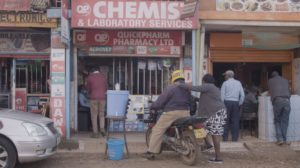Member Spotlight: NCD Alliance
COVID-19 and NCDs: Looking back, looking forward, acting now
By Katie Dain, CEO, NCD Alliance

The Coronavirus pandemic has made living with a non-communicable disease even harder – limiting access to medicine, hospital care and community support. People with NCDs are also more likely to suffer from a severe form of COVID-19 if infected. Do you want to know more? Watch the mini-film “NCDs in a global crisis”. Produced by BBC StoryWorks for NCD Alliance and Access Accelerated.
Two decades ago, the World Health Assembly recognised that the “long-term needs of people living with NCDs are rarely dealt with”. And indeed, in spite of many political commitments made since then, we are now paying the price for years of underinvestment.
Since the beginning of the NCD Alliance in 2009, we have worked to address the largest, and yet most underfunded, public health issue globally. For decades, noncommunicable diseases (NCDs) have been overlooked by leaders and policymakers, and the result is that more than one in five people worldwide now live with one or more NCD, with the heaviest burden falling on the countries and communities least able to afford it. However, it took an infectious disease to make governments see that NCDs cannot be ignored without putting the health and security of populations at high risk.
People living with NCDs, and related conditions including obesity, are more susceptible to becoming severely ill and dying from COVID-19. The vast majority of nearly 4 million lives already lost to COVID-19 were people living with underlying health conditions, most commonly hypertension, cardiovascular disease and diabetes. People living with NCDs have also been cut off from essential care services. The toll of disrupted healthcare – e.g. late cancer diagnoses, postponed stroke treatments, supply chain failures for lifesaving insulin – might well be bigger than the pandemic itself. And finally, we are seeing the evidence of “long COVID”, which has a range of effects for months after recovery, including damage to organs.
Yet, NCDs continue to be systematically overlooked in crisis preparedness planning and COVID-19 responses. The failure of leaders to focus on NCDs and their risk factors has made people, communities and economies more fragile when facing this pandemic – as was also the case for SARS and MERS.
For far too long, NCDs have been the Cinderella issue of global health. Although political commitments have been made, including three UN High-Level Meetings and the Sustainable Development Goals, this has not moved the dial on global NCD financing. NCDs are collectively the target of just 1.7% of health-related development assistance.
In every country, a massive effort is needed to increase investments in prevention, screening, early diagnosis and treatment of these diseases, which today cause more than 70% of global deaths and represent seven of the ten leading causes of death worldwide.
Governments know what works to reduce the NCD burden and save lives. It’s time for them to act. As a leader and convener of NCD civil society, the NCD Alliance will continue making a strong case for investment in NCD prevention and care as a core component of building back better and fairer for people and planet – government inaction will cost far more. COVID-19 underscores the need to think long term, and invest in healthier, more resilient populations to limit the impact of future pandemics.
We must not shy away from the hard lessons of COVID-19, but seize this moment to create a new normal where equality and equity are embedded in our societies, and where all people, everywhere, have access to the health care they need.
About the Author
Katie Dain is CEO at the NCD Alliance, a global network of civil society organizations dedicated to transforming the fight against noncommunicable diseases. Dain has worked with the NCD Alliance since its founding in 2009. She is widely recognized as a leading advocate and expert on NCDs and co-chairs the World Health Organization’s Civil Society Working Group on NCDs.
About the NCD Alliance
The NCD Alliance (NCDA) is a registered non-governmental organisation (NGO) based in Geneva, Switzerland, dedicated to supporting a world free from preventable suffering, disability and death caused by noncommunicable diseases (NCDs). Founded in 2009, NCDA brings together a unique network of over 300 members in more than 80 countries into a respected, united and credible global civil society movement. The movement is unified by the cross-cutting nature of common risk factors including unhealthy diets, harmful use of alcohol, tobacco smoking, air pollution and physical inactivity, and the system solutions for chronic NCDs such as cancer, cardiovascular disease, chronic lung disease, diabetes, mental health and neurological disorders.